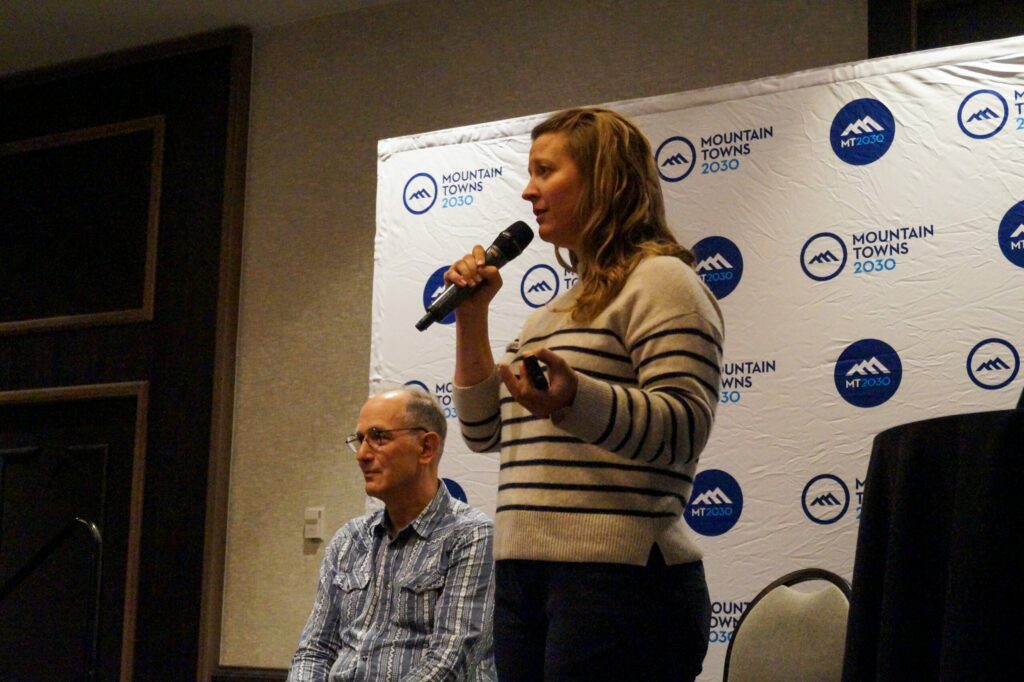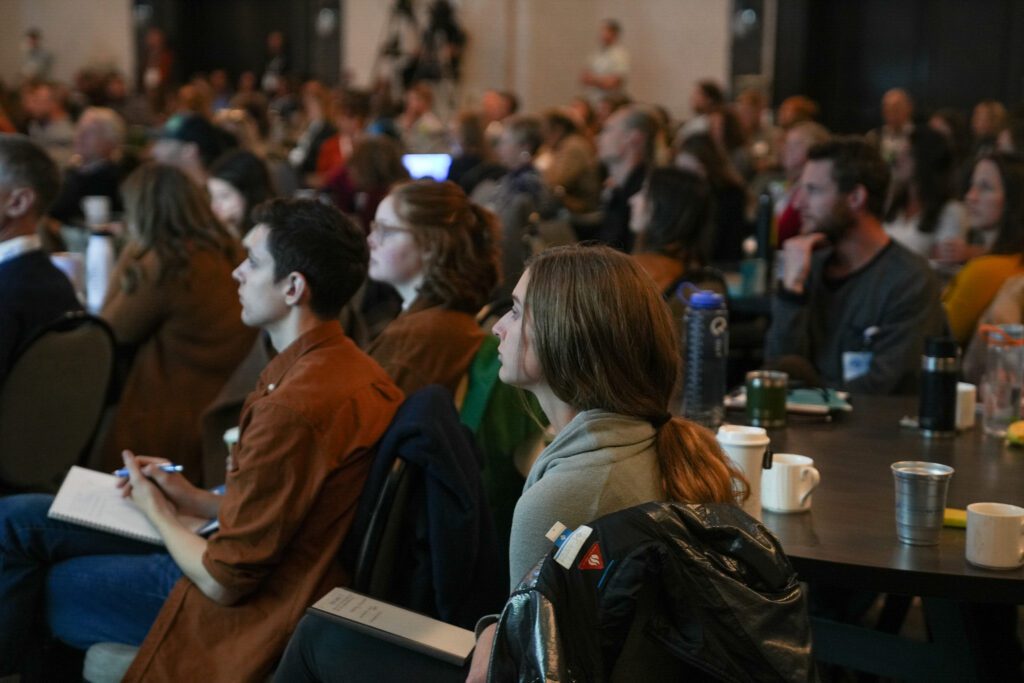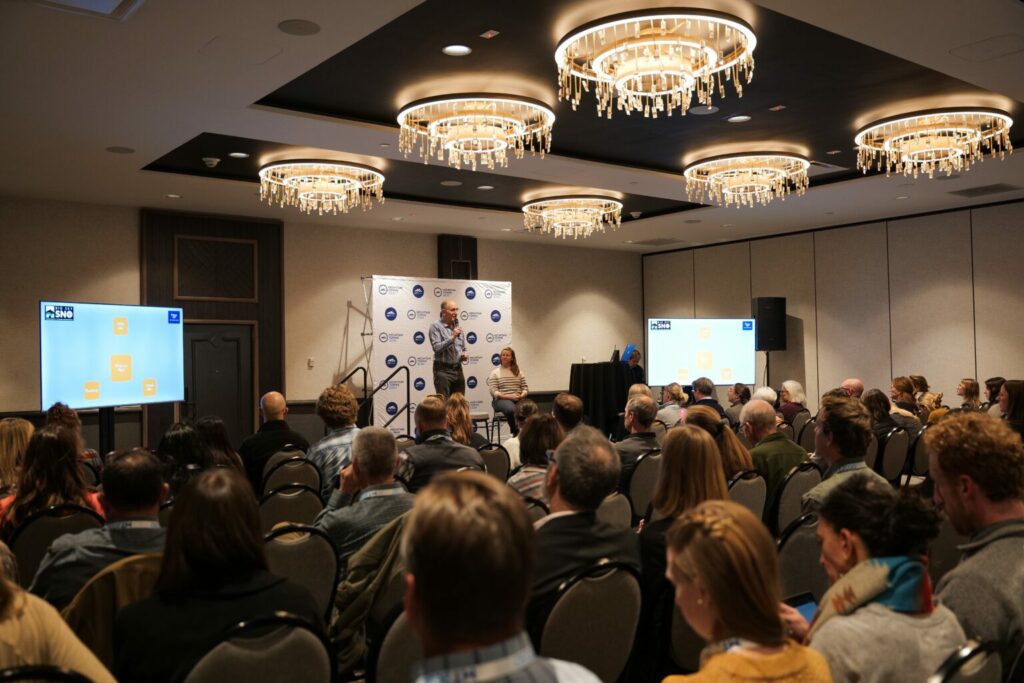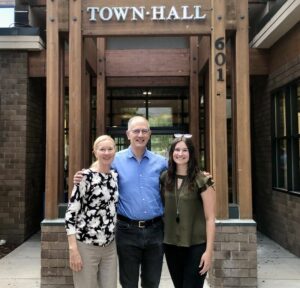
Lizzie Peyton of Big Sky SNO and Jerry Tinianow of WestUrb explain how Big Sky is activating against climate change. PHOTO BY BRIAN SWEZY / MOUNTAIN TOWNS 2030
By Lizzie Peyton and Jerry Tinianow
Mountain towns compete with each other—for talent, grants, visitors and investments. In recent years, however, they have set the competition aside and collaborated to address human-caused climate change.
At the Mountain Towns 2030 conference in Vail, Colo. on Oct. 18 and 19, over 500 representatives of mountain towns, ski resorts, government agencies and nonprofits met to share ideas on how they could work together to reduce greenhouse gas emissions, increase environmental resilience, and influence other people and places to do the same.
MT2030 was launched in 2019 in Utah by the Park City Community Foundation. At its inaugural meeting that year, a small number of towns and businesses developed a coalition-driven organization to take on climate change. Mountain towns like Big Sky and the resorts within them are at risk of losing business and employment because of declining snowfall and related problems that climate change is already causing. Those problems are likely to worsen in the years to come, absent substantial reductions in human-caused emissions.

No single city, town, or resort can solve this problem alone. The hope is that by working together and finding allies, the worst effects of human-caused climate change can be avoided, particularly given that these mountain towns adore and thrive on their unfettered access to breathtaking wilderness.
MT2030 includes “2030” because the latest report from the United Nations’ Intergovernmental Panel on Climate Change says that GHG emissions worldwide must be cut in half by 2030. Mountain towns know that they need to do better than half, because other places that are less at risk or have fewer resources may not act so assertively.
After getting off to a rousing start in 2019, MT2030 hit an immediate obstacle. The COVID pandemic prevented the group from meeting again until 2022. Its meeting that year, in Breckenridge, Colo., attracted a much larger audience than the first one in 2019. This year’s meeting in Vail brought an even larger turnout, showing that collaboration on climate change among mountain towns is increasingly seen as urgent.
Big Sky teaches and learns
The Big Sky community was well represented at this year’s event. The Big Sky delegation included representatives from Big Sky Resort—as Boyne Resorts sponsors the conference—in addition to Lizzie Peyton, director of community sustainability with Big Sky Sustainability Network Organization (SNO), and representatives from Yellowstone Club and Lone Mountain Land Company.
On the first day of the conference, Peyton and Jerry Tinianow of WestUrb—a consultant assisting Big Sky SNO in implementing Big Sky’s Climate Action Plan released in February 2023—led a session on how to create a plan that would not just sit on a shelf. A room packed with leaders from mountain towns and ski resorts throughout North America learned how Big Sky has gotten off to a fast start with its own climate action implementation, and how they could achieve similar success with a focus on local collaboration.

In addition to leading a discussion of climate action planning, Big Sky also showed leadership by being one of a handful of towns announcing commitments to specific actions. Big Sky SNO announced that, within the next year, it plans to launch a “Green Build Toolkit” as an online platform to help owners, architects, contractors, and developers to reduce GHG emissions from buildings while saving money over the life of those buildings.
The Big Sky contingent wasn’t just at the conference to teach and inspire; they were also there to learn. The group attended a variety of breakout sessions on topics ranging from how to reduce energy consumed by heating outdoor spaces like sidewalks and pools, to strategies used to influence sustainable behaviors by tourists, and tips on coordinating land use, housing and transit programs to make housing and transportation convenient and affordable.
One important moment for Montana during the conference came during a keynote presentation by K.C. Becker, the administrator of region 8 of the U.S. EPA. Region 8 recently gave the Montana Department of Environmental Quality $3 million to develop a statewide plan to reduce GHG emissions.
In announcing the kickoff meeting for the planning effort earlier in the month, DEQ said it would use the money to plan for “measures that can effectively curb pollution without imposing additional regulatory burdens on businesses and individuals.” Becker was asked whether the country could cut GHG emissions 50% by 2030 exclusively through measures that do not impose “additional regulatory burdens on businesses and individuals.”
Becker did not answer the question directly but did note that a new, much larger round of competitive implementation grants would be offered to states this spring. In deciding who receives those grants, she said, the EPA would decide which states had taken climate action planning seriously. Montana could be at a disadvantage if its statewide plan lacks ambition.
Defending against climate change won’t be easy. It’s comforting to know that Big Sky can turn to a large group of similar towns and resorts to share best practices and get the job done by working together.
In recent weeks, Big Sky SNO has hit the ground running in its efforts to implement the community climate action plan. It recently persuaded the Madison County Commission to begin the process of creating a “C-PACE District” in the county. This will open the door to affordable financing of energy efficiency and renewable energy improvements in commercial buildings in the county. Big Sky SNO is also organizing a training session next spring for HOA managers on how to incorporate sustainability and climate action into HOA operations, responding to expressions of interest by several of the area’s major HOA managers.
Lizzie Peyton is Big Sky SNO’s director of community sustainability. Jerry Tinianow is the proprietor of WestUrb and served as Denver’s chief sustainability officer from 2012 to 2019.


